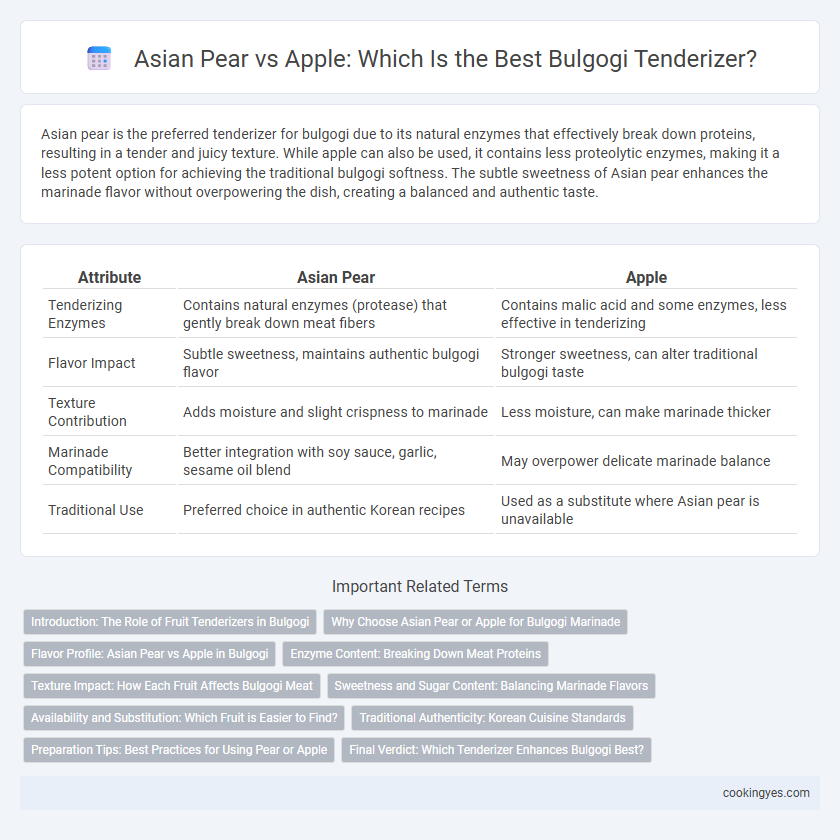Asian pear is the preferred tenderizer for bulgogi due to its natural enzymes that effectively break down proteins, resulting in a tender and juicy texture. While apple can also be used, it contains less proteolytic enzymes, making it a less potent option for achieving the traditional bulgogi softness. The subtle sweetness of Asian pear enhances the marinade flavor without overpowering the dish, creating a balanced and authentic taste.
Table of Comparison
| Attribute | Asian Pear | Apple |
|---|---|---|
| Tenderizing Enzymes | Contains natural enzymes (protease) that gently break down meat fibers | Contains malic acid and some enzymes, less effective in tenderizing |
| Flavor Impact | Subtle sweetness, maintains authentic bulgogi flavor | Stronger sweetness, can alter traditional bulgogi taste |
| Texture Contribution | Adds moisture and slight crispness to marinade | Less moisture, can make marinade thicker |
| Marinade Compatibility | Better integration with soy sauce, garlic, sesame oil blend | May overpower delicate marinade balance |
| Traditional Use | Preferred choice in authentic Korean recipes | Used as a substitute where Asian pear is unavailable |
Introduction: The Role of Fruit Tenderizers in Bulgogi
Fruit tenderizers like Asian pear and apple play a crucial role in bulgogi by breaking down proteins to enhance meat tenderness and flavor absorption. Asian pears contain higher levels of proteolytic enzymes such as bromelain, making them particularly effective for marinating beef in traditional Korean recipes. Apples, while also providing sweetness and slight tenderizing effects, have lower enzyme activity but contribute a unique fruity aroma and a subtle caramelization when cooked.
Why Choose Asian Pear or Apple for Bulgogi Marinade
Asian pear is traditionally preferred in bulgogi marinade due to its high enzyme content, particularly protease, which effectively breaks down meat fibers for a tender texture. Apples can also tenderize meat with their natural sugars and acidity but tend to impart a sweeter flavor compared to the subtle, crisp taste of Asian pear. Choosing Asian pear enhances the authentic flavor profile while ensuring efficient tenderization, making it ideal for classic bulgogi recipes.
Flavor Profile: Asian Pear vs Apple in Bulgogi
Asian pear lends a crisp, mildly sweet flavor with subtle floral notes that complement the savory richness of bulgogi, enhancing its natural umami without overpowering. Apple imparts a sweeter, fruitier taste with a hint of tartness that adds a distinct contrast, balancing the soy-based marinade and creating a complex flavor profile. Both fruits tenderize effectively, but Asian pear's delicate sweetness and texture maintain the traditional authenticity and nuanced depth typical of classic bulgogi.
Enzyme Content: Breaking Down Meat Proteins
Asian pears contain a higher concentration of proteolytic enzymes such as ficin, which more effectively break down muscle fibers in bulgogi meat, resulting in a tender texture. Apples offer milder enzymatic activity with natural acids that tenderize meat more gently over time. The enzyme content in Asian pears accelerates protein breakdown, making them a preferred tenderizer in traditional bulgogi marinades.
Texture Impact: How Each Fruit Affects Bulgogi Meat
Asian pear enhances bulgogi's texture by breaking down proteins gently, resulting in a tender yet slightly crisp bite that preserves the meat's juiciness. Apple, with higher acidity and sugar content, accelerates meat softening but can create a softer, less structured texture that may lack the subtle firmness offered by Asian pear. Choosing Asian pear over apple promotes a balanced texture where bulgogi remains tender without becoming mushy, improving overall mouthfeel and flavor absorption.
Sweetness and Sugar Content: Balancing Marinade Flavors
Asian pear offers a higher sugar content compared to apple, providing a natural sweetness that enhances the umami flavors in bulgogi without overpowering the dish. The subtle fruity sweetness of Asian pear creates a balanced marinade by tenderizing the meat while maintaining a harmonious flavor profile. Apples, while sweet, contain less sugar and may result in a milder sweet undertone, making Asian pear the preferred choice for a perfectly sweet and tender bulgogi marinade.
Availability and Substitution: Which Fruit is Easier to Find?
Asian pears are more commonly used in traditional bulgogi recipes due to their crisp texture and mild sweetness that tenderizes meat effectively. However, apples are often easier to find in many international markets, making them a convenient substitute without compromising flavor. Both fruits contain natural enzymes that help break down proteins, but availability typically influences the choice for bulgogi preparation outside Asia.
Traditional Authenticity: Korean Cuisine Standards
Asian pear is the traditional choice for tenderizing bulgogi in Korean cuisine, prized for its natural enzymes that break down meat fibers while preserving authentic flavor. Apples are sometimes used, but they alter the marinade's sweetness and texture, potentially straying from time-honored recipes. Maintaining authenticity in bulgogi preparation aligns with Korean culinary standards that emphasize balance and subtlety achieved through ingredients like Asian pear.
Preparation Tips: Best Practices for Using Pear or Apple
Asian pear offers a sweeter, juicier profile with a fine-grained texture that tenderizes bulgogi effectively while adding subtle fragrance. Apples, typically Fuji or Granny Smith, provide a firmer texture and higher acidity, which can enhance meat softening but require grated or pureed preparation to avoid fibrous bits. For best results, finely grate or blend the fruit before mixing it into the marinade, ensuring even distribution and optimal absorption for tender, flavorful bulgogi.
Final Verdict: Which Tenderizer Enhances Bulgogi Best?
Asian pear is the preferred tenderizer for bulgogi due to its high enzyme content, which effectively breaks down proteins and results in a tender, juicy texture. Apples can also be used but tend to impart a sweeter flavor and slightly less tenderizing power compared to Asian pears. For authentic bulgogi with optimal tenderness and flavor balance, Asian pear remains the best choice.
Asian pear vs apple for bulgogi tenderizer Infographic

 cookingyes.com
cookingyes.com